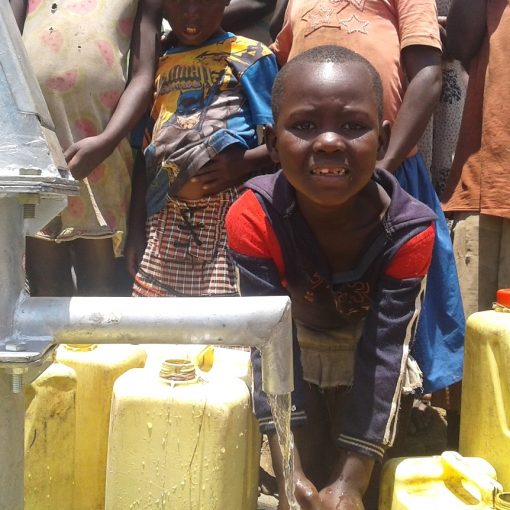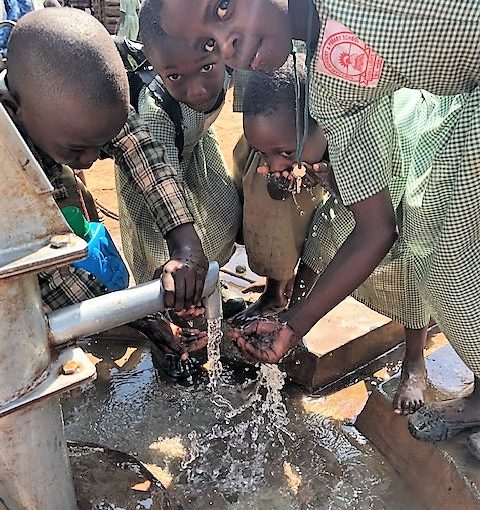I wrote “Burdens” because I found out what a terrible disease bilharzia is. When we were in the village of Kyakajoro, I asked the lady with bilharzia if her disease was fatal. She looked at me and said, ” all our illnesses are fatal if not treated. Even though I asked the question, I did not know how to respond to her answer. So, I didn’t. On the way home, I realized what she was telling me. She was telling me that she was dying from the water that she had been drinking.
After “Burdens” was posted, we got an immediate response. Money was made available to get this lady treatment for her disease. I called Herbert and informed him that we could now bring her to Hoima (the local city) for treatment. It just so happened that the CEED team was in Kyakajoro to drill a borehole. We talked with Rodger, the team leader, and asked him to inquire about the lady with bilharzia. He told us that she had died. Although this news upset us, we decided to confirm her death with a phone call to the village councilman. During the phone call, the councilman informed us that she had not died but that she was in a clinic. Herbert asked for her contact and said that he would make arrangements to have her brought to Hoima for treatment. After a few days with this lady not returning Herbert’s phone calls, he was able to talk with her and assure her that she would be safe and get the care she needed.
On Thursday morning, November 7th, we heard that Agatha and her mother would be in Hoima by 11:00 am. It was nice to have a name for her. Herbert called the hospital and the doctor to inform them that Agatha and her mother would soon be there. When Herbert said that it was time to go to the hospital, I decided that I would not be going as it could make Agatha uncomfortable if I visited. Herbert knows the culture and the people. He had told me that Agatha hadn’t returned his phone calls because she was afraid of men taking her from the village.
At 4:00 pm, Herbert stopped by my house and told me that Agatha was not the lady with bilharzia that we had met in the village but a very sick 14-year-old girl. Not understanding how it had happened, we agreed that this little girl had been placed in our hands and that we would see that she received treatment. Herbert showed me a picture of her in her hospital bed and said that the doctors were doing the necessary tests.
Herbert offered to pick me up the next day so we could visit her, but I had a commitment to go to the Nursing School graduation in Hoima and was unable to go with him. I asked Herbert to send me a message when he found out how Agatha was doing. I was anxious to hear how she was doing.
I was two hours into the graduation ceremony when I got Herbert’s short and sad message. “Agatha has died.” As part of the graduation celebration, the students were performing a traditional dance.

I was trapped in a sea of joy but felt as sad as I have been in many years. There was no way out! The rain had started, and as it poured down, all the unanswered questions played in my head. How? Why? Did the lady with the disease decide that Agatha needed treatment more than her? Did the councilman choose for us? Why didn’t I act sooner? None of that mattered now. Agatha was gone.
We found out that Agatha had a fragile heart. Perhaps we could never have saved her. The money provided for her medical treatment was now being used to pay the hospital, purchase a casket, and provide transport for her body and her mother back to her village.
Agatha is now in the company of the angels and no longer in need of her frail, weak, earthly body, but her family and her village still grieve.
The CEED team will continue to visit villages like Agatha’s. We will continue to provide clean, cold, healthy water for thousands of children and their families with your help, but we can only do it with your help.
Sincerely,
West




2 thoughts on “Terrible Disease”
Thanks for sharing this sad, real life story, Jim. Keep up the great work brother and stay strong. We love you bro and are so thankful for you and your heart for these hurting, beautiful people.
Awe Jim the change in emotions happen so fast there! Sadness, hope, joy, etc. So sorry for the loss of Agatha and not finding the woman in need. But thanking God Agatha had a chance at the Clinic and her Mom and village and can give her a proper burial. Continue on brother in serving our Lord and bringing clean water & the Living Water to all those in need ini the most beautiful Continent! Continued prayers for you all! Staazi!